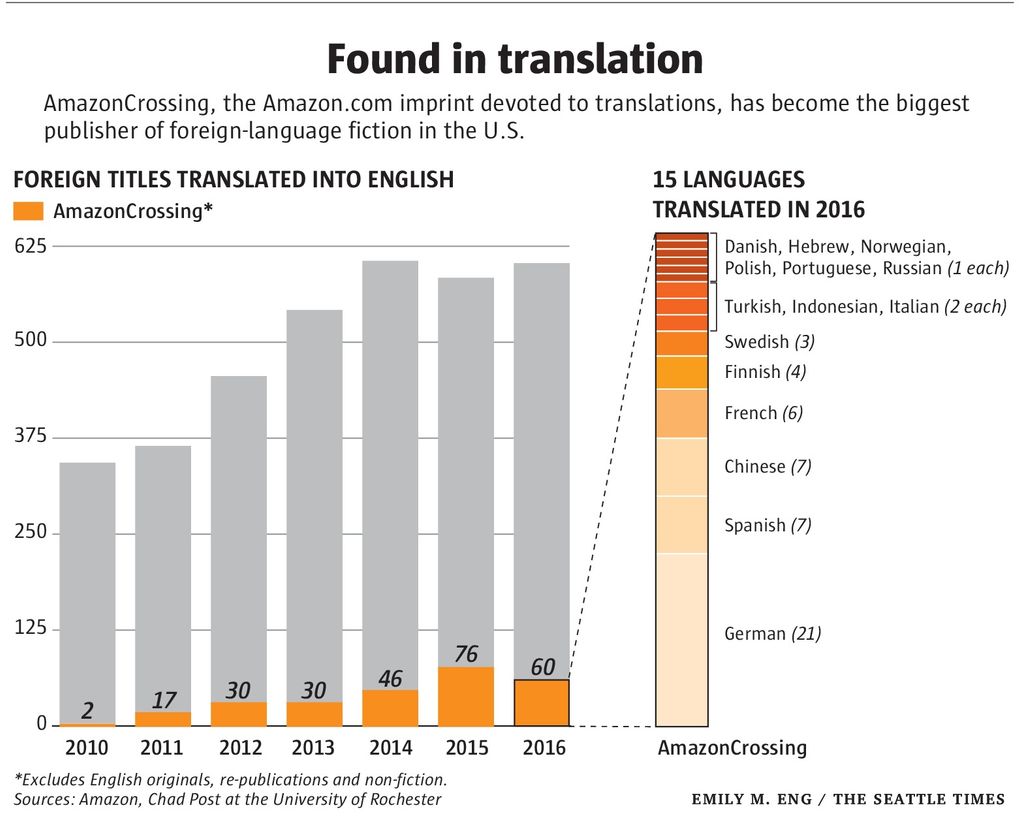The literary translation community in the U.S. has a tradition of being highbrow, a carefully tended yet narrow reflection of the stirrings of global culture beyond the Anglosphere.
Then Amazon.com jumped in, like a whale into a koi pond.
Armed with financial might and an intimate, machine-learned knowledge of reader behavior, the e-commerce giant made a big splash.
That annoyed some literary types, wary of the leviathan that has shaken up almost every aspect of the media world.
But AmazonCrossing, the publishing unit devoted to scouring the world for good tales, has in a short time become the most prominent interpreter of foreign fiction into English, accounting for 10 percent of all translations in 2016, more than any other publishing house in a field populated by small imprints.
It helps that Amazon is rather numbers-driven about its tastes, which tend toward blockbuster genre fiction — crime thrillers and romance novels — although it also picks well-regarded literary jewels its editors feel would do well with an English-speaking audience.
The goal “is to find great stories, and we think you can find them anywhere,” said Gabriella Page-Fort, AmazonCrossing’s editorial director.

Amazon’s rapid rise to prominence in the translation of foreign prose is yet another sign of its growing cultural significance.
In Hollywood, this newfound power has been recognized by critics and industry peers: In February Amazon Studios garnered three Oscars. Series such as “The Man in the High Castle” and “Transparent” have earned Emmy and Golden Globe awards.
In the book world, Amazon has enabled hundreds of thousands to self-publish their works on Kindle, its digital reading platform. Some of these works — such as Andy Weir’s “The Martian,” which became a best-seller and a movie — have made an impact.
It also has several imprints devoted to various genres, including literary fiction.
Yet Amazon’s shine has been tarnished by a contentious relationship with New York publishing houses, bookstores and some authors. Many bookstores — hurt by the online retailer’s dominance in book sales and its pricing power — have boycotted titles published by Amazon. They’re also less likely to get reviewed by the traditional literary outlets, experts say.
But some members of the literary-translation community, long beset by indifference from major publishers and a lack of resources, appreciate Amazon’s foray in their field.
“It’s kind of amazing. They have the resources and the ability,” says Chad Post, an academic at the University of Rochester who publishes Three Percent, a blog about international literature that draws its name from the estimate that only 3 percent of all books published in English are translated from foreign languages.
In the blog, Post keeps a thorough database of literary translations into English — which clearly shows Amazon’s trajectory to the top. In 2010, AmazonCrossing’s first year, the imprint published two of 340 foreign translations, or less than 1 percent — one from German and one from French. In 2016, there were 607 fiction and poetry translations and Amazon was responsible for about 10 percent, in languages as diverse as Finnish, Hebrew, Indonesian and Chinese.
By focusing on genre fiction, Amazon is “filling a huge gap” and helping people in the community get “more experience, become better as translators,” Post said.
Not all have super-warm feelings for the Seattle behemoth, however.
Susan Bernofsky, who teaches literary translation at Columbia University’s master of fine arts writing program, says that because of Amazon’s practice of demanding “advertising fees” from small publishers whose books it sells on its website to subsidize its discounted prices, Amazon is still perceived by many translators as having an exploitative relationship with the literary world. The company “has been financially throwing its weight around,” and is viewed with suspicion by many who perceive it as seeing books as mere products, she said.